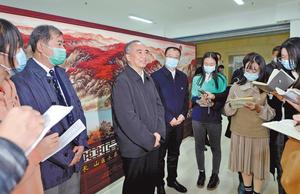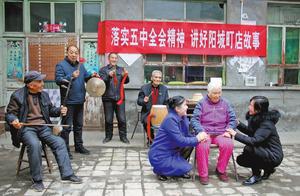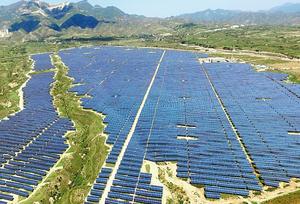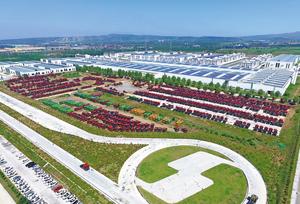New industrial growth pattern, rural development, environmental protection and deepening reforms high on provincial authorities' agenda
 Lin Wu (third left), governor of Shanxi, shares his understanding of the plenary session with teachers and students at Shanxi Medical University in Taiyuan. (LI ZHAOMIN / FOR CHINA DAILY)
Lin Wu (third left), governor of Shanxi, shares his understanding of the plenary session with teachers and students at Shanxi Medical University in Taiyuan. (LI ZHAOMIN / FOR CHINA DAILY)
The Fifth Plenary Session of the 19th Central Committee of the Communist Party of China was held in Beijing from Oct 26 to 29.
The session adopted the CPC Central Committee's proposals for the formulation of the 14th Five-Year Plan (2021-25) for National Economic and Social Development and the Long-Range Objectives Through the Year 2035, according to a communique released from the conference.
In Shanxi, a new growth pattern should be realized through transitioning from a resource-reliant economy to one with diversified sectors and multiple growth engines
Lou Yangsheng, Party secretary of Shanxi province
By outlining the blueprints for national economic and social development for the next five years and long-term goals for the next 15 years, the plenary session provided an important signal of China's future development.
In Shanxi, as well as the rest of the country, the meeting has been warmly received and both local officials and residents have a consensus view on the results. They believe this historic meeting has marked the country's entry into a new era of development.
On Nov 15, the Standing Committee of the Shanxi Provincial Committee of the Communist Party of China held a special meeting to publicize the content and essence of the Fifth Plenary Session.
Delegates to the meeting agreed that both offline and online measures should be used to spread the spirit of the session to every part of society, including Party and governmental institutions, the countryside, business communities and even university campuses.
Prior to the meeting, Lou Yangsheng, Party secretary of Shanxi, made a three-day tour of the province to spread the spirit of the session.
He visited Jiangxian, Yuanqu, Pinglu and Xiaxian counties from Nov 10-12 to meet with government officials, business representatives, workers and farmers.
He required officials, entrepreneurs and residents to thoroughly study the results of the Fifth Plenary Session and use the session's proposals and guidelines to guide their work.
The provincial Party chief said that the plenary session is a crucial meeting to help to realize the great rejuvenation of the nation and offer guiding principles for development in various areas.
 Residents in Tingdian township in Yangcheng county publicize the plenary session in the form of folk art. (YIN CHUNLEI / FOR CHINA DAILY)
Residents in Tingdian township in Yangcheng county publicize the plenary session in the form of folk art. (YIN CHUNLEI / FOR CHINA DAILY)
New growth pattern
"The communique said China will nurture a strong domestic market and establish a new development pattern," Lou said.
"The country will comprehensively deepen reform in the pursuit of a high-level socialist market economy.
"In Shanxi, a new growth pattern should be realized through transitioning from a resource-reliant economy to one with diversified sectors and multiple growth engines."
As a province that once heavily relied on coal mining, Shanxi is now diversifying its economy through industrial reform and upgrading.
According to Lou, the province is using cutting-edge technologies such as cloud computing, big data, artificial intelligence, smart manufacturing, mobile internet, the internet of things, industrial internet and blockchain to create eight new economic pillars.
The eight pillars are information technology, civil aviation, finance, cultural tourism, new energy and new materials, natural gas, advanced manufacturing and modern chemicals.
"The communique of the plenary session said that China will continue to take the real economy as the focus of its economic development," Lou said. "Shanxi will build itself into a high-quality manufacturer and enhance its strength in cyberspace and digital technology."
 Lin Wu (third left), governor of Shanxi, shares his understanding of the plenary session with teachers and students at Shanxi Medical University in Taiyuan. (LI ZHAOMIN / FOR CHINA DAILY)
Lin Wu (third left), governor of Shanxi, shares his understanding of the plenary session with teachers and students at Shanxi Medical University in Taiyuan. (LI ZHAOMIN / FOR CHINA DAILY)
To make the successful industrial transition to a new development model, Shanxi should use its emerging IT sectors, especially the internet and digital technologies, to upgrade its traditional industries and foster new areas for growth, Lou said.
He said a document released by the provincial government earlier this year called IT-based innovation "the No 1 program in Shanxi." Provincial officials believe IT can lead to "a beneficial ecosystem for startups in many emerging industries".
Lou said the Party committee and the government of Shanxi recently outlined targets for the province's economic transformation.
"A new development model featuring industrial diversification will be initially formed during the 14th Five-Year Plan, and Shanxi is expected to have an established, high-quality development pattern in the five-to-10 years to follow," he said.
To make the shift possible, he said Shanxi should overcome its pressing challenges and grasp emerging opportunities.
"The challenges we need to solve include development disparity among different regions and sectors, between rural and urban areas and between growth and the environment," Lou said.
"The key to overcoming the challenges is innovation. We should foster new growth areas, like high-tech and environmentally friendly industries in the urban regions and modern, organic agriculture and tourism in the countryside. Well-planned urbanization is also a solution to the urban-rural disparity."
 Migratory birds such as white egrets nest in a wetland in Qingxu county, as a result of improvements in natural environment. (ZHANG TAIYI / FOR CHINA DAILY)
Migratory birds such as white egrets nest in a wetland in Qingxu county, as a result of improvements in natural environment. (ZHANG TAIYI / FOR CHINA DAILY)
Rural development
The Party chief highlighted the importance of rural development and environmental protection during his trip.
"The communique said China will prioritize the development of agriculture and rural areas, and fully advance rural vitalization," Lou said.
"We have seen great changes happening in the countryside during the past several years. And I'm sure people will find rural Shanxi a better place to live in the years to come.
"I'm also fully confident that rural development in Shanxi will be offered stronger momentum with the support of the CPC Central Committee and the central government.
"The communique said that China will advance green development and promote harmony between humans and nature," Lou continued. "In Shanxi, we will devote more energy to environmental protection and ecological recovery by taking more strict measures to control pollution."
The Party chief also highlighted the need to further open up.
"The communique said China will pursue high-level opening-up and explore new prospects of win-win cooperation," Lou said.
He said the business community in Shanxi should carefully study the global and domestic economies.
"As international trade faces challenges due to the COVID-19 pandemic, Chinese authorities have proposed a dual circulation development pattern, highlighting both domestic and international markets.
"We should make full use of domestic and international resources to solve the pressing challenges in economic operations and forge win-win cooperation with our partners at home and abroad," Lou said.
In addition to Lou, other senior officials of the Shanxi CPC committee and the provincial government have traveled across Shanxi to publicize the spirit of the Fifth Plenary Session.
 A solar power station soaks up the sun in Daixian county as it helps to lift locals out of poverty. (ZHAO WENGUI / FOR CHINA DAILY)
A solar power station soaks up the sun in Daixian county as it helps to lift locals out of poverty. (ZHAO WENGUI / FOR CHINA DAILY)
In Changzhi, a city in the southeastern part of Shanxi, Shi Shuai, deputy chief of the United Front Department of the Shanxi CPC Committee, hosted a two-hour meeting with local officials and residents on Nov 20.
Shi explained the 14th Five-Year Plan and the Long-Range Objectives Through the Year 2035, sharing his suggestions on how to use national plans to guide local planning.
At the meeting, Changzhi Mayor Yang Qinrong said the local government should map out its own innovative plans based on the spirit of the plenary session.
"In the next five years and beyond, poverty reduction, balanced economic development and environmental protection will be the priorities of the government's agenda," Yang said.
Yang Xiaoshan, Party secretary of Xin'anquan township in the city, said she is happy with the agricultural and rural development-related policies proposed by the plenary session.
"As an official working for agriculture and rural affairs, I'm fully aware of the importance of my mission," Yang Xiaoshan said. "We have made great achievements in poverty alleviation this year and we will devote more efforts to creating a well-off society in our town."
Feng Zhijun, chief of the Shanxi State-owned Assets Supervision and Administration Commission, presided over a meeting on Nov 18 in Shanxi Coking Coal Group based in Taiyuan, the provincial capital of Shanxi.
During the meeting, which was attended by representatives from Shanxi's major State-owned enterprise, Feng said the development of SOEs will be important in realizing the goals of the 14th Five-Year Plan and long-range objectives in the years to come.
 The Datong special vehicle plant of Shaanxi Automobile Group is part of Shanxi's latest efforts in transforming from a resource-reliant economy to one with diversified sectors and multiple growth engines. (WANG ZHONGXUN / FOR CHINA DAILY)
The Datong special vehicle plant of Shaanxi Automobile Group is part of Shanxi's latest efforts in transforming from a resource-reliant economy to one with diversified sectors and multiple growth engines. (WANG ZHONGXUN / FOR CHINA DAILY)
Deepening reforms
"The vitality of SOEs should be dependent on deepening reforms and improving corporate governance according to the requirements of the plenary session," Feng said.
On Nov 16, Wu Jun, chief of the Shanxi Education Department, hosted a meeting in Taiyuan to share his understanding of the Fifth Plenary Session with delegates from Shanxi's primary, middle and vocational schools and universities.
When asked how to develop a high-quality education system according to the requirements of the plenary session, Wu said: "At the institutional level, a high-quality education system should focus on balanced development of various sectors including elementary schools, vocational schools and colleges and universities, to meet people's expectations for better education and society's demands for qualified human resources as well as resources in science, technology and culture.
"From the viewpoint of the educated, a high-quality education system means that students will have more opportunities to integrate their personal and career developments with the great revitalization of the Chinese nation."
In addition to provincial authorities, officials at community levels have organized their own meetings and symposiums for studying the Fifth Plenary Session.
The villagers' committee in Qingzhong village in the city of Shuozhou held a meeting on Nov 9.
"The Fifth Plenary Session prioritizes agriculture and rural affairs," said Wei Jun, Party chief of the village.
"Thanks to the State's rural revitalization and targeted poverty-relief strategies, all the villagers in Qingzhong were lifted from absolute poverty this year.
"While consolidating our achievements in poverty alleviation, we will shift our efforts to realizing higher-quality rural growth through agricultural modernization and developing more industries with local characteristics.
"Our goal is to develop an all-around well-off society, to make sure that all of our villagers can be financially stable and live happier lives," Wei said.


